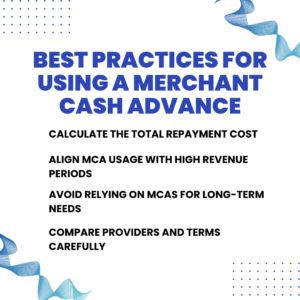Merchant Cash Advance Canada: Your Guide to Quick Business Funding
Merchant Cash Advances (MCAs) offer Canadian small business owners a unique way to access funds quickly, with repayments based on future sales. From fast approval times to flexible repayment terms, MCAs have become increasingly popular for business owners needing immediate financial support. This article covers everything you need to know, from how to choose and apply to the best providers to understanding the advantages and disadvantages of MCAs. It will also explain how MCAs compare to traditional loans.
Introduction to Merchant Cash Advances in Canada
Canadian small business owners face unique challenges, especially when it comes to financing. Traditional banks may have lengthy approval processes, high credit score requirements, and strict repayment terms that aren’t always feasible. MCAs fill this gap by offering faster approval times and adaptable repayment structures, giving businesses the agility they need to cover expenses, manage cash flow, or invest in growth. Whether you own a restaurant, run a retail shop, or manage a service-based business, MCAs can be a quick funding solution that aligns with your sales volume and growth pace.
How a Merchant Cash Advance Works
A Merchant Cash Advance works by giving businesses an upfront sum in exchange for a portion of future credit and debit card sales. Essentially, an MCA is a cash injection that’s repaid as a percentage of your daily sales. This unique repayment structure adjusts with your revenue—if sales are high, repayments increase; if sales slow down, repayments decrease proportionally.
Let’s simplify it: imagine an MCA as an ‘advance on your business’s future earnings.’ For example, if you secure a $10,000 advance with a 15% repayment rate, each day, 15% of your daily sales will go toward repaying the balance. This flexibility makes it easier to manage cash flow compared to fixed monthly loan payments.
Benefits of a Merchant Cash Advance in Canada
Merchant Cash Advances offer multiple benefits, particularly for businesses that may not qualify for traditional loans:
Quick Access to Funds
MCAs provide faster access to capital than bank loans. Many MCA applications are reviewed and approved within 24-48 hours, and funds can be available within days, sometimes even hours. This quick funding turnaround is invaluable for businesses facing unexpected expenses, seasonal demands, or growth opportunities.
Flexible Repayment Based on Sales
Repayment amounts are directly linked to your sales volume. When sales are high, you repay more; during slower periods, your payments adjust. This flexibility ensures that repayment doesn’t overburden your cash flow, making MCAs ideal for businesses with fluctuating sales cycles.
Lower Credit Requirements
Traditional banks usually require strong credit scores and collateral, but MCAs focus more on your business’s revenue history. This allows businesses with fair or low credit scores to access funding, as long as they can demonstrate a stable cash flow.

Potential Drawbacks of MCAs
Despite their flexibility and accessibility, MCAs also come with some challenges:
Higher Costs and Factor Rates
MCAs typically come with a ‘factor rate’ rather than a traditional interest rate, which can make them more expensive than bank loans. For instance, a factor rate of 1.2 on a $10,000 MCA means you’ll repay $12,000, regardless of how quickly you pay off the advance. Unlike interest on loans, the cost of an MCA is fixed upfront, so paying it off faster won’t reduce the overall cost.
Impact on Daily Cash Flow
Since MCA repayments come directly from daily sales, businesses will see a reduction in their daily cash flow until the balance is fully repaid. This ongoing deduction can strain businesses with tight profit margins or irregular income.
Less Regulation
In Canada, MCA providers aren’t as heavily regulated as banks, which can lead to a wide range of fees, terms, and factor rates. This lack of uniformity requires business owners to carefully review contracts and choose reputable providers.
Merchant Cash Advance vs. Business Loans in Canada
When considering an MCA vs. a business loan, it’s essential to understand the differences to make an informed choice. Here’s a side-by-side comparison:
| Aspect | Merchant Cash Advance | Business Loan |
| Approval Speed | Fast (1-3 days) | Slower (1-3 weeks) |
| Repayment Structure | Flexible, based on sales | Fixed monthly payments |
| Cost Structure | Factor rate | Interest rate |
| Qualification | Sales history prioritized | Credit score, collateral prioritized |
| Application Process | Simple, minimal paperwork | Lengthy, extensive documentation |
For businesses with steady cash flow and good credit, traditional loans are often more affordable. However, MCAs are beneficial when time is a priority, or if credit history is an issue.
How to Apply for a Merchant Cash Advance in Canada
Applying for an MCA involves a few straightforward steps:
- Prepare Financial Records: Collect recent bank statements, merchant account transactions, and tax documents. Most providers require a minimum of three months of transaction history.
- Choose an MCA Provider: Compare different MCA providers to identify one with competitive terms and transparent fees.
- Submit an application: Fill out the application online, which typically takes only a few minutes.
- Review Terms and Sign: After approval, review the terms thoroughly, paying special attention to the factor rate, fees, and repayment structure.
- Receive Funds: Once you accept the terms, funds are usually deposited within 24-48 hours.
Top Merchant Cash Advance Companies for Small Businesses
Choosing a reliable MCA provider can make a big difference in terms of cost and service. Here are some reputable providers in Canada:
- Greenbox Capital: Specializes in fast funding with flexible terms. Greenbox Capital considers a variety of industries and has lenient credit requirements.
- Loans Canada: Offers a straightforward application process and provides customizable MCA options tailored to different business needs. Discover more at Loans Canada.
- Merchant Growth: Known for lower factor rates, Merchant Growth serves high-revenue businesses and offers flexible repayment terms. Visit Merchant Growth to learn more.
Each of these providers has unique strengths and may cater to specific industries or funding needs. Research and compare options to find the one that best aligns with your business goals.
Key Requirements for MCA Approval
To qualify for an MCA in Canada, businesses generally need to meet these criteria:
- Consistent Monthly Sales: Most providers require $7,500 to $15,000 in monthly credit/debit card sales.
- Operational History: Typically, six months of business operation is a standard requirement.
- Financial Stability: While credit scores are less critical, providers will look at your overall cash flow and sales history.
Best Low-Fee Merchant Cash Advance Options
Finding a low-fee MCA provider requires thorough research. Providers like Greenbox Capital and Merchant Growth offer competitive rates, but you may also find local credit unions with MCA options that suit your business type. Look for providers with transparent fee structures, as hidden fees can add significant costs.
Using a Merchant Cash Advance Strategically
MCAs are best utilized for immediate business needs that have a direct impact on growth, such as purchasing inventory, covering payroll during peak times, or launching marketing campaigns. For example, a retail store might use an MCA to stock up on seasonal products, knowing that higher sales during the holiday season will cover the advance quickly.
Merchant Cash Advance Rates and Fees
MCA rates and fees are typically higher than traditional loans. Factor rates usually range from 1.1 to 1.5, meaning a $10,000 MCA at 1.2 will require $12,000 in repayment. Check the effective annual percentage rate (APR) to get a clearer picture of the true cost.
Alternatives to MCAs in Canada
If an MCA isn’t the right fit, consider these alternatives:
- Business Line of Credit: Allows you to borrow as needed, paying interest only on what you use.
- Invoice Factoring: Provides cash based on outstanding invoices, ideal for businesses with pending payments.
- Business Credit Card: Provides flexible funding, although with interest rates.
Understanding Repayment Terms
MCAs differ from traditional loans due to their unique repayment method, which is based on a percentage of daily sales rather than fixed monthly payments. This flexibility helps businesses manage repayment during slower sales periods without the pressure of fixed amounts. However, the cost of an MCA is determined by a factor rate (typically 1.1 to 1.5), which means businesses pay a set amount regardless of the duration of repayment. This is why, even with flexible daily deductions, businesses should account for the overall repayment cost before committing to an MCA.
Industry Suitability for MCAs
MCAs can be a great fit for certain industries, particularly those with high daily sales volume and a steady flow of credit or debit card transactions. Here are some examples of industries where MCAs are particularly popular and effective:
- Retail: Stores often use MCAs for seasonal inventory purchases or to bridge cash flow gaps during sales fluctuations.
- Restaurants: Restaurants benefit from MCAs due to high daily sales volumes, allowing them to repay advances more effectively while funding renovations, menu changes, or staffing.
- Service-Based Businesses: Businesses that accept credit card payments regularly, such as spas or salons, can manage MCA repayments more seamlessly based on their predictable sales cycles.
- E-Commerce: Online retailers with steady sales often turn to MCAs to handle promotional events or to stock up on high-demand products.
Each industry has unique cash flow needs, and understanding the nuances of how MCAs fit into your specific business model is key.
Best Practices for Using a Merchant Cash Advance
Using an MCA wisely can provide your business with the flexibility it needs, but careful planning is essential to avoid unexpected financial strain. Here are some best practices to consider:
- Calculate the Total Repayment Cost: Before accepting an MCA, understand the factor rate and calculate the total repayment to ensure it’s a viable solution for your business.
- Align MCA Usage with High Revenue Periods: Consider using MCAs for expenses that will directly impact revenue growth, such as marketing campaigns or high-demand inventory.
- Avoid Relying on MCAs for Long-Term Needs: MCAs are best for short-term funding needs; relying on them continuously can lead to high cumulative costs.
- Compare Providers and Terms Carefully: Researching and comparing providers ensures you secure the best possible terms and avoid hidden fees or unfavorable conditions.
By following these best practices, business owners can leverage MCAs without overextending their financial resources, ensuring the advance remains a tool for growth rather than a financial burden.

Merchant Cash Advance Rates and Fees Explained
Understanding MCA costs involves examining factor rates and potential fees, which vary across providers. Unlike loans, MCAs do not charge traditional interest. Instead, providers use a factor rate, generally between 1.1 and 1.5. This rate is applied to the advance amount to determine the total repayment. For instance, a $10,000 advance with a 1.3 factor rate will require a repayment of $13,000. Some providers may also add fees for application processing, account maintenance, or early repayment, so be sure to review the contract carefully.
Alternatives to MCAs in Canada
While MCAs offer quick funding, some alternatives may be better suited to certain businesses, depending on their specific needs:
- Business Lines of Credit: Allow businesses to borrow and repay as needed, paying interest only on the amount borrowed. Lines of credit are beneficial for companies with ongoing, variable funding needs.
- Equipment Financing: Provides funding specifically for purchasing or leasing equipment. Repayment is typically based on the equipment’s expected useful life, which can reduce monthly costs.
- Invoice Factoring: Ideal for businesses with outstanding invoices, as it involves selling these receivables at a discount for immediate cash.
- Term Loans: For businesses that qualify, traditional term loans offer lower interest rates and fixed payments, often making them more affordable for long-term expenses.
Each alternative has its advantages, and exploring these options alongside MCAs can help you make a well-rounded funding decision.
Conclusion
Merchant Cash Advances in Canada provide a flexible, accessible financing option for businesses needing quick capital to cover immediate expenses or take advantage of growth opportunities. By understanding how MCAs work, their costs, and their potential drawbacks, business owners can make informed decisions about whether an MCA is the right fit for their needs. MCAs may be ideal for short-term expenses or cash flow gaps, especially for businesses with fluctuating revenue. However, it’s essential to compare providers, review terms, and consider the total repayment cost to maximize the benefits of an MCA while minimizing risks.
FAQs
- What is a merchant cash advance in Canada?
A merchant cash advance is a funding solution that provides businesses with a lump sum of cash in exchange for a portion of future credit and debit card sales. Unlike traditional loans, MCAs have flexible repayment terms based on sales, making them a viable option for businesses with varying cash flows. - How is a merchant cash advance different from a business loan?
MCAs are repaid based on daily sales percentages, while traditional loans have fixed monthly payments. Additionally, MCAs focus more on a business’s revenue history rather than credit scores, allowing more accessibility for some small businesses. - What are the typical requirements for an MCA in Canada?
Most MCA providers in Canada require businesses to have a minimum monthly sales volume of around $7,500 to $15,000, a stable revenue history, and several months of operational history. - Are there low-fee merchant cash advances available in Canada?
Yes, there are several low-fee MCA options available. Providers such as Greenbox Capital, Loans Canada, and Merchant Growth offer competitive rates and may have transparent, lower fees. However, it’s essential to review terms to ensure no hidden charges. - Can I repay a merchant cash advance early?
Most MCAs can be repaid early; however, unlike traditional loans, the total repayment amount is typically fixed upfront, so early repayment won’t necessarily reduce the total cost. Check with your provider for specific terms regarding early repayment.









